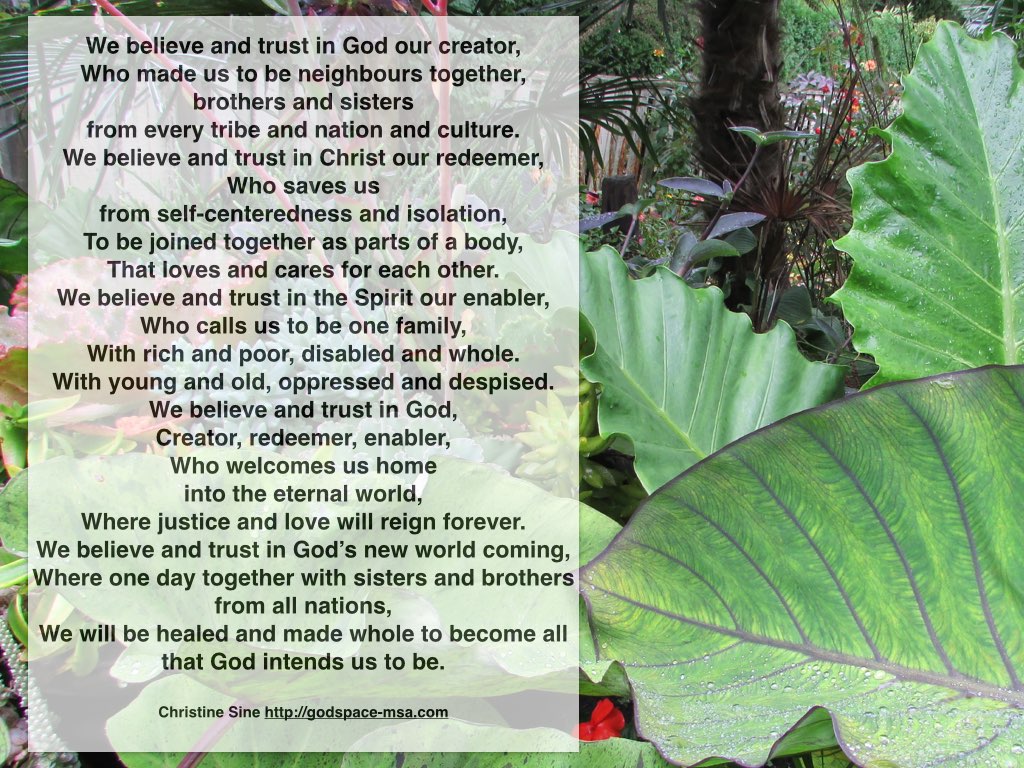by Christine Sine
Last week we posted this very powerful Immigrant’s creed and on Friday I reposted a link to these beautiful creeds by St Patrick. It reminded me of a series of posts I did several years ago on writing my own creed the one featured above. Establishing a personal creed as a statement of faith seems like an important thing to do during the season of Lent and I challenge you to take time this week to do that.
Create Your Own Creed
Make a list of your core beliefs and the spiritual practices that nurture those beliefs on a regular basis. Look over the list and prayerfully consider: Is your faith strong and vibrant or weak and frail? What provides the iron and steel you need to grow your faith into the future?
Read through the Nicene Creed and Apostles’ Creed or listen to this version of the Apostles’ creed. In what ways do these statements reflect your own beliefs? What would you like to add or subtract? Use them as a foundation for writing your own creed. You may want to memorize it, but more importantly, you need to read through this creed regularly so that you are confident in what you believe.
Use Your Creed Faithfully
1. Read your statement of faith regularly. Over the weekendI have been reading my statement of faith each morning. Sometimes I read it out loud. Other times I read it quietly to myself allowing its truths to sink deep into my spirit refreshing and renewing my soul. It resonates deep within me strengthening my faith in what I believe and why I follow Christ.
2. Use your creed as a focus for meditation. This is an exercise that could take weeks or even months (maybe during the season of Easter.) Use each phrase of your creedal statement as a focusing point for your daily meditations. Progress slowly through the entire statement over a period of days or weeks allowing the spirit to remind you of who God is and what the implications for your life are.
This morning I started this process by meditating on “we believe and trust in God our Creator.” My thoughts revolved around the daily distractions and corrupting influences that so easily draw me away from trusting in God alone. Concern about the future is a big one for me and I think for many others in our world today. I know how easily these concerns can lead to the worship of other gods – economic security for today, financial provision for tomorrow, even fear itself become gods that consume our attention each day.
These thoughts drew me into the scriptures to verses that encourage me to trust in God for my provision. My favourite is Psalm 37: 3-7. Trust in the Lord and do good… It is a great reminder of our need always to trust in the one true God and not be consumed by other gods. It is also a reminder that our trust should lead to action. Often one of the barriers to doing good is our concern about how we will provide for ourselves.
That led me to ask: Why do I think that God is trustworthy? That of course opened up another whole area of meditation and reflection that will probably carry me through the rest of the week.
3. Keep a journal of your reflections about God and your faith. Writing down our meditations and reflections is a wonderful way to reinforce our faith and strengthen our beliefs. I suggest you write your entire creedal statement out at the beginning of this section in your journal. Then write the phrase you want to focus on at the top of a fresh page. Write down your reflections. Add scriptures as they come to mind.
4. Put your thoughts into action. What is one thing you could do today that will reinforce your beliefs? How can I reinforce my belief in the trustworthiness of the One true God? How do I shut out the distracting voices that lead me to worship other gods? My decision for today is to pause regularly throughout the day to recentre my spirit on God, something that is easier said than done. Tomorrow I will share what happened.
5. Repeat the process daily or more frequently if necessary. This is not a one time exercise. Reminding ourselves about our core beliefs and transforming these into action is something that should form the backbone of our spiritual practices.

